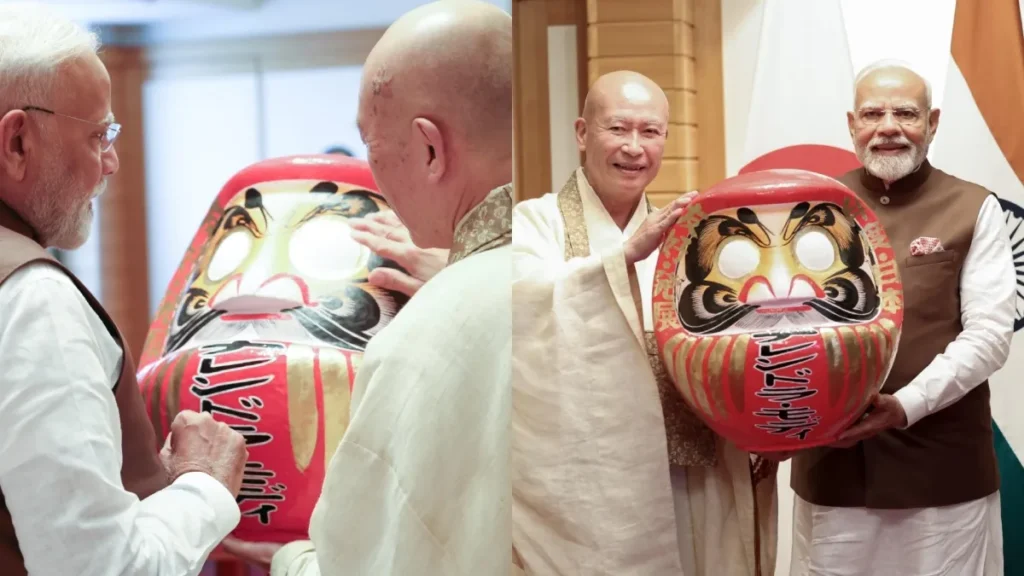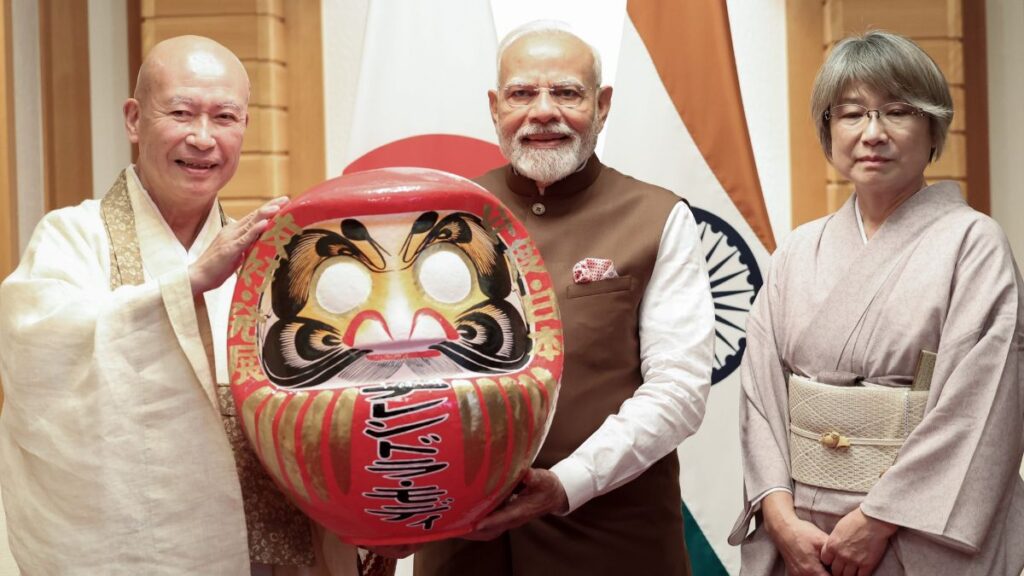Prime Minister Narendra Modi’s ongoing diplomatic tour of Japan has captured global attention not only for its political and economic significance but also for a culturally symbolic moment. During his visit, PM Modi was presented with an auspicious Daruma doll, a traditional Japanese talisman that signifies resilience, determination, and good fortune. The gesture marks a blend of diplomacy, culture, and shared values between India and Japan, reinforcing the strong bond between the two Asian powers.
What is a Daruma Doll?

The Daruma doll, also known as Dharma doll, is a hollow, round, and brightly colored Japanese traditional doll modeled after Bodhidharma, the founder of Zen Buddhism. It is considered a symbol of perseverance, goal-setting, and luck. Typically painted red with white and black features, Daruma dolls are designed without arms or legs and return to an upright position if tilted — symbolizing the Japanese proverb “Nanakorobi yaoki” (七転び八起き) which means “Fall down seven times, get up eight.”
The Daruma’s most unique feature is its blank eyes. Traditionally, the recipient fills in one eye upon setting a goal and fills in the second when the goal is achieved. This ritual signifies focus, determination, and the journey of overcoming challenges — qualities deeply connected to both personal growth and national development.
Significance of the Gift to PM Modi
The presentation of the Daruma doll to Prime Minister Modi holds deep symbolic meaning. Japan, by gifting this iconic talisman, is recognizing India’s resilience, growth aspirations, and the leadership vision of PM Modi. It is also a gesture that signifies the shared cultural values of discipline, patience, and determination between the people of India and Japan.
For India, a country rapidly advancing in technology, infrastructure, and global diplomacy, the Daruma doll reflects the spirit of perseverance in the face of challenges and the commitment to long-term goals, much like Japan’s own post-war resurgence and modernization.
India-Japan Relations: A Strong Partnership
The exchange of the Daruma doll comes against the backdrop of expanding India-Japan relations. The two nations have consistently strengthened their strategic, economic, and cultural ties over the last decade.
- Economic Collaboration: Japan has been one of the largest investors in India, particularly in infrastructure projects like the Mumbai-Ahmedabad bullet train project. Japan’s technology and India’s large consumer market are viewed as complementary strengths.
- Cultural Ties: Buddhism is a shared spiritual link. With the Daruma doll tracing its roots back to Bodhidharma, the connection highlights centuries-old cultural and religious bonds.
- Strategic Partnership: Both countries are members of the Quad Alliance (India, Japan, USA, Australia) and collaborate on ensuring stability in the Indo-Pacific region.
- Educational and Technological Exchange: Collaborations in AI, semiconductors, clean energy, and skill development continue to define the partnership.
The gifting of the Daruma doll is not just symbolic but also reflects mutual respect for cultural traditions, strengthening people-to-people connections.
Daruma Doll and Indian Philosophy

While the Daruma doll is distinctly Japanese, its roots in Bodhidharma and Zen Buddhism connect it to India’s spiritual past. Bodhidharma, an Indian monk, traveled to China and later influenced Japanese Zen practices. By gifting PM Modi a Daruma doll, Japan is in a way acknowledging the historical link between Indian spiritual traditions and Japanese culture.
For Indians, the doll can be likened to the concept of Sankalpa (firm resolve) in Hindu philosophy, where focus and determination are central to achieving success. Both traditions emphasize inner strength, persistence, and the triumph of the human spirit.
Symbolism in Diplomacy
Diplomatic gifts often carry deep symbolic meaning. Unlike standard protocol gifts, a culturally rich token like the Daruma doll represents more than hospitality — it communicates friendship, shared values, and goodwill.
In this case, the Daruma doll given to PM Modi can be interpreted as:
- Encouragement for India’s Vision: It signifies support for India’s aspirations in global leadership, technological innovation, and sustainable growth.
- Recognition of Resilience: A nod to India’s perseverance through challenges such as the pandemic, economic hurdles, and geopolitical complexities.
- Hope for Mutual Goals: Just as the doll represents goal-setting and achievement, the gesture may highlight both nations’ common objectives in regional peace, economic collaboration, and climate commitments.
Public Reactions and Media Buzz
The cultural symbolism of the gift has attracted wide coverage in both Indian and Japanese media. Many commentators note that the Daruma doll perfectly encapsulates PM Modi’s image of resilience and goal-driven leadership. On social media, Indian users praised the gift as a “perfect cultural connection,” while Japanese citizens expressed pride in their traditions being shared at the global diplomatic stage.
Beyond Symbolism: What Lies Ahead
The gifting of the Daruma doll is likely to be remembered as a defining cultural moment in India-Japan diplomacy. However, the visit’s importance also lies in the concrete outcomes expected:
- Strengthened collaboration in defense technology and cyber security.
- Increased Japanese investments in India’s manufacturing and digital economy.
- Joint projects in clean energy, electric mobility, and climate resilience.
- Expansion of student exchange programs and skill development initiatives.
With India emerging as a global economic powerhouse and Japan continuing to be a technological leader, this partnership is expected to set benchmarks for Asian cooperation.
Conclusion
Prime Minister Narendra Modi’s receipt of the Daruma doll in Japan is more than a ceremonial exchange — it is a powerful symbol of resilience, determination, and shared cultural history. It reflects not just personal goodwill but also a deep-rooted acknowledgment of the India-Japan friendship that continues to grow stronger with time.
As India looks toward ambitious developmental goals by 2030 and beyond, the Daruma doll’s message — “fall seven times, rise eight” — resonates perfectly with the nation’s journey. The symbolic gift may well inspire both countries to persevere in achieving their common goals of peace, prosperity, and global leadership.

